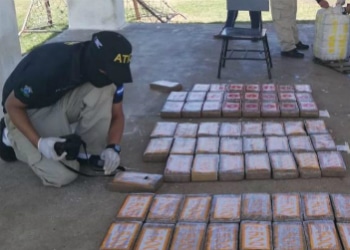Authorities in Honduras arrested four Colombian citizens caught in an attempt to smuggle over 100 kilograms of cocaine into the United States through a remote region of the country’s eastern coast, an example of increased drug flow through Honduras.
Agents from Honduras’ Technical Criminal Investigation Agency (Agencia Técnica de Investigación Criminal de Honduras – ATIC) seized 110 kilograms of cocaine and arrested the four suspects during an anti-drug sting in the department of Gracias a Dios, the Attorney General’s Office announced in an April 6 press release.
The four men, identified as Francisco Antonio Fuentes Arce, Clayton Humphries Brand, Will Hooker Rivera and Darwin Forbest Pacheco, fled in a motorboat and were pursued by Honduras navy personnel until they ran aground on a reef.
SEE ALSO: Honduras News and Profile
The Colombians belonged to a transnational criminal structure while the shipment was to be received by a group based in Honduras, according to authorities. Further details about the groups behind this operation were not revealed.
This trafficking operation was based in La Mosquitia, a region of dense rainforest and swamps, which is almost inaccessible by land. It extends along Honduras’ Caribbean coast as far as Nicaragua and has been a strategic spot for the smuggling of drugs by plane and boat from South America to the United States.
InSight Crime Analysis
Criminals have used the remote area of La Mosquitia as a trafficking spot for years. But the role Honduras has played as an international drug-trafficking transit point has grown steadily in relation to the increase of Colombia’s cocaine production.
While South American narcos have exploited the Caribbean trafficking route for years, the cocaine corridor in Central America has been revitalized. As a result, countries like Guatemala, Honduras, Costa Rica and Panama are widening their role in the international drug trafficking.
SEE ALSO: Coverage of Cocaine
These increasingly important roles have also generated a rise in corruption among security forces and government officials.
In Costa Rica, for example, security forces have been involved in the handling of their own drug trafficking networks. In Panama, drug smuggling groups depend on corrupt port officials to provide security in the drug shipments and hide illegal merchandise.

